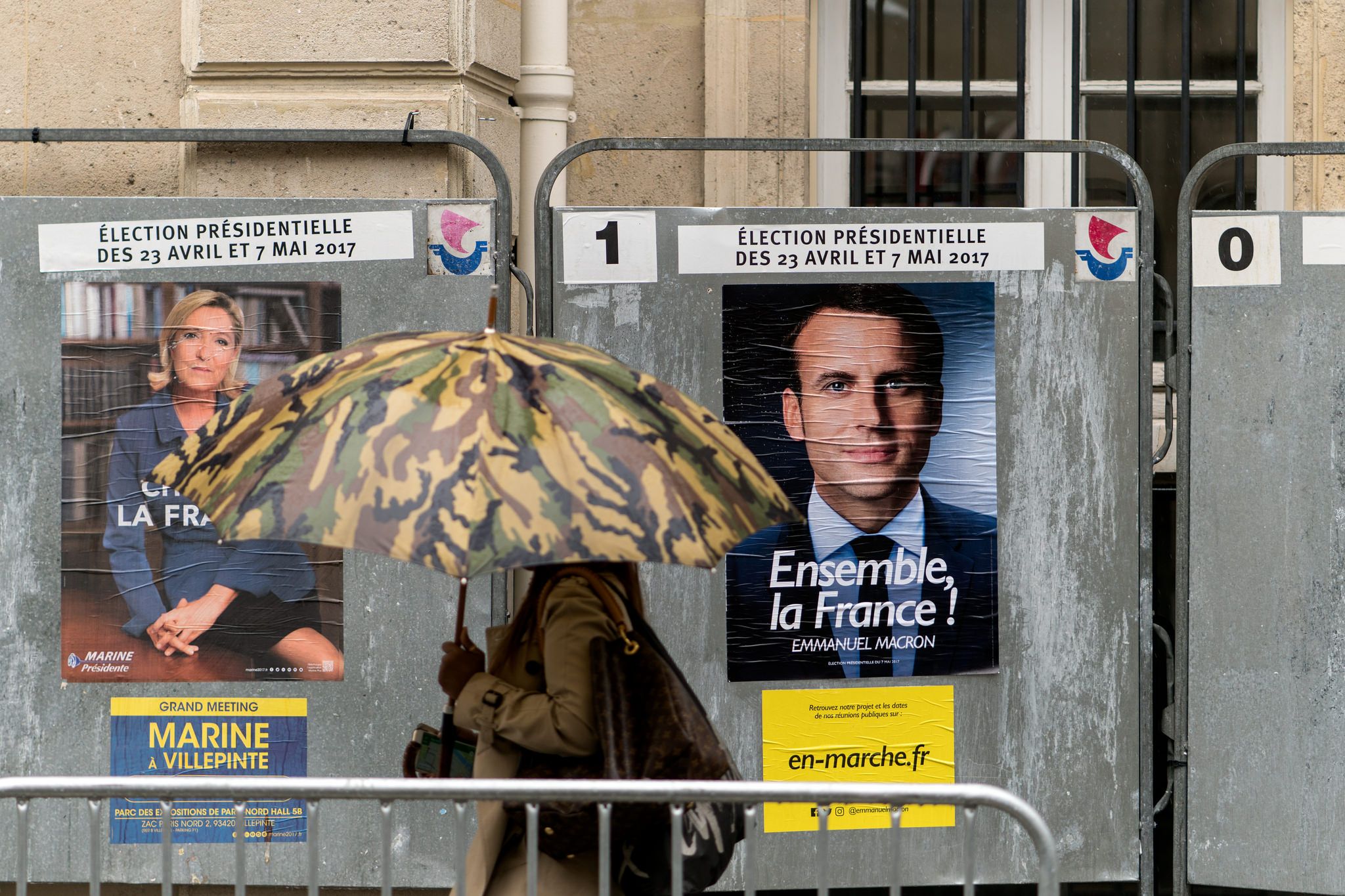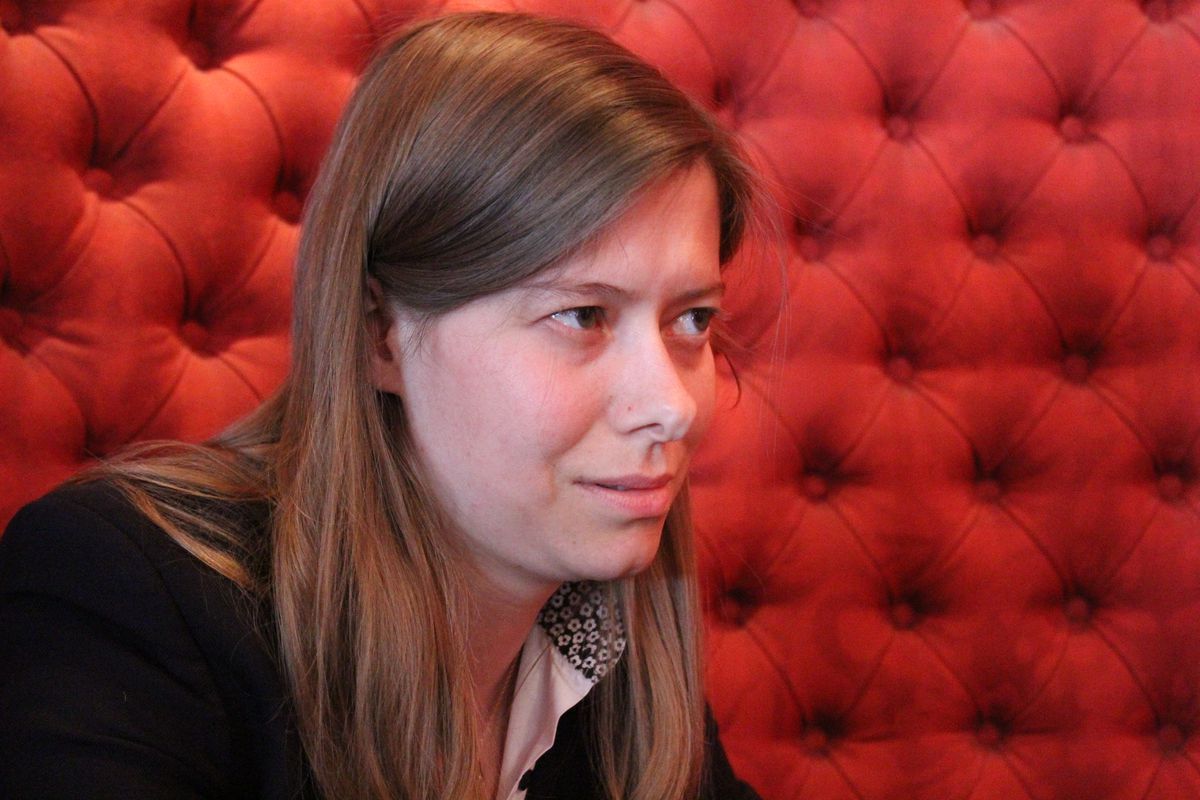PARIS — Far-right French presidential Marine Le Pen has a simple a message she wants to get across to the country’s gay community: Cast a vote for her in Sunday’s presidential elections because she and her party will protect them from Islamist violence.
It’s a tough sell for Le Pen, whose platform opposes same-sex marriage and adoption and whose father — who created the party she now leads — has called homosexuality a “biological anomaly” and said those with HIV should be housed in “AIDS-atoriums.”
More recently, the elder Le Pen outraged many in France by criticizing a eulogy delivered at the memorial service for a gay policeman killed in a recent terror attack.
But it’s a message Le Pen believes will resonate in a community that she claims is a target of Muslim fundamentalists. The outreach to France’s LGBTQ voters is another way in which Le Pen, currently a distant second to centrist frontrunner Emmanuel Macron, is trying to bring American-style identity politics to France as she works to overcome her party’s history of xenophobia, anti-Semitism, and homophobia.
During Wednesday night’s unusually nasty debate with Macron, Le Pen said her opponent was backed by a French Muslim organization that she accused of holding conferences featuring speakers who express “hatred of Jews” and “hatred of homosexuals.” (To which Macron replied dryly, “I think it quite something to find you speak words of defense for homosexuals and Jews.“)
It wasn’t the first time Le Pen has targeted the organization. In an April YouTube video, she said it has held events featuring a Muslim cleric who has spoken out “in favor of corporal punishment, the death penalty for homosexuals, and the assassination of Jews.”
In a pre-debate interview with a French TV station, she also firmly disavowed her father’s comments about the funeral of a police officer killed in a recent attack in Paris. “I found this ceremony very dignified, and I was very touched by the speech of his companion," she said.
Le Pen has been trying to make inroads with LGBTQ voters since even before launching her presidential campaign. In 2015, Paul Parant, then the online editor of Têtu, a French gay magazine, told Slate that Le Pen was promising to “defend Jews and gays against the Arabs.” The message, he added, was resonating. “People are buying into it,” he said.
It’s not just rhetoric: Le Pen has also surrounded herself with three high-level gay advisers, including her right-hand man, Florian Philippot, who is often identified as the architect of her effort to remake her party’s image, and Sébastien Chenu, who was a former founding member of a gay rights organization called GayLib.
Many of France’s top gay leaders disdain Le Pen, and it’s not clear what percentage of the gay vote she’ll get on Sunday. The very fact that she’s extending a hand to the community, though, tells you a lot about her largely successful efforts to make her party palatable to broad swaths of the French public — and why that may still not be enough to help her overcome Macron’s massive lead in the polls.
When it comes to gay rights, France isn’t as liberal as you’d think
France’s upcoming election has been marred by a strong dose of homophobia (including persistent rumors that Macron was gay). That, in part, reflects a surprising thing about the country. American fantasies about French open-mindedness toward all things sexual aside, a vocal minority of French voters are deeply uncomfortable with the advancements gay men and lesbians have made in the past few years.
Same-sex marriage and the right of same-sex couples to adopt in France only became legal in May 2013. (By contrast, Spain passed same-sex marriage in 2005). Legal domestic partnership was available to gay men and lesbians — as well as heterosexual couples — since 1999, but marriage equality in the historically Catholic country was far harder to achieve.
There are other examples: It remains illegal for lesbian couples to use in vitro fertilization with sperm from a donor to get pregnant in France. It was only in October 2016 that transgender men and women could change their legal gender without first submitting to surgical sterilization.
The same-sex marriage debate is still not settled. In 2013 and 2016, tens of thousands of protesters took to the streets to rally against marriage equality and issued calls for France’s presidential candidates to support “traditional family values.” Most of the French public supports same-sex marriage — by early spring 2013, the pro-marriage swath of society was a healthy 63 percent of the population — but a vocal, angry minority holds strongly traditional views on marriage and family structure.
The issue is so important to conservative voters that presidential candidate François Fillon ran hard to the right on LGBTQ issues, promising to roll back the law granting marriage equality and, crucially, adoption rights to gay men and lesbians. “France is more rightwing than it has ever been,” he said in January.
“I will put the family at the heart of all public politics,” Fillon said before the first round of the election (he finished third, leaving him out of the running for the presidency). Family, he added in a clear reference to adoption rights for same-sex couples, was “certainly not a place for dangerous social experimentation.”
Even Macron, who has the support of many leaders of France’s LGBTQ community, isn’t as much of a progressive on the issue as you might expect. He supports the law giving gay men and lesbians the right to marry and adopt, but he has been thus far relatively quiet on remaining issues — like surrogacy and assisted reproductive technology for gay couples, which remains illegal in France, and the right of gay men to donate blood.
He also angered the LGBTQ community back in February, when he tried to extend an olive branch to the anti-gay crowd in France by saying he understood they felt “humiliated” when same-sex marriage passed.
Enter Le Pen, who is trying to tread a narrow line between her current public comments about protecting the gay community and her party’s long history of anti-gay rhetoric and policies. In raw political terms, that means reaching out to the social conservatives Fillon courted and to the LGBTQ voters who would traditionally reject her party out of hand.
This is why a candidate of the far right is courting France’s LGBTQ community
Le Pen is a part of what French political scientist Nonna Mayer calls the “second generation” of far-right politicians in Europe. The first generation was associated with a kind of religious conservative, and explicitly Christian, ideology. Le Pen and others in her age group, by contrast, say they are defending democracy and liberal values from Muslim fundamentalists actively opposed to both. Saying she supports the rights of gays, Mayer told me, allows Le Pen to imply she and her party “are open-minded.”
There are some who find those Le Pen’s gay advisers, and her promises, convincing enough. A widely covered poll last year found that 38.6 percent of married gay men voted for her National Front party in regional elections, but as BuzzFeed notes, “that bloc generally skews older and more conservative than the LGBT population as a whole.” Subsequent polling has found that Le Pen’s party draws the support of just 16.5 percent of gay voters.
Still, Le Pen is trying to capitalize on whatever latent support she can find among LGBTQ voters. Frédéric Martel, the author of a history of France’s gay community, told me Le Pen isn’t particularly focused on gay rights. “Among [her] priorities, Muslims are more important than the gay issue,” he said. “She doesn’t have this prejudice against gay people like her father.” (He was quick to then say there were plenty of other reasons to protest her candidacy.)
Other members of her family do, however.
Le Pen’s 27-year-old niece Marion Maréchal Le Pen is an up-and-coming politician in the National Front who is far more openly anti-gay than her aunt. Back in March, she said same-sex marriage “opened the path to polygamy.” Then just last week, she promised marriage equality would be annulled as soon as her aunt was elected president.
Le Pen’s father, meanwhile, sparked controversy in recent days after condemning the eulogy Etienne Cardiles delivered for his partner, French police officer, Xavier Jugelé, who was killed in April by an Islamist radical.
The service, the elder Le Pen said, was a tribute “more to the homosexual than the police officer,” adding that it “institutionalized gay marriage and exalted it in a public way, and that shocked me.”
Le Pen, who had ousted her father from his position at the helm of the National Front in 2015, duly distanced herself from the remarks. For many on the left side of France’s political spectrum, however, the comments simply reinforced the idea that the party has not changed.
Winning over LGBTQ voters is, unsurprisingly, a tough sell for a far-right leader
Jöel Deumier, the president of the gay rights group SOS Homophobie, doesn’t mince words when talking about his opinion of Le Pen.
“Marine Le Pen’s program is clearly homophobic and transphobic,” he said. “If Marine Le Pen was elected tomorrow, she will take away [gay] marriage. ... For her, family is father, mother, and children.”
Catherine Michaud, a Paris council member who directs the gay rights group GayLib, said Le Pen’s platform makes clear “in black and white that she will roll back some of the rights, protections, and marriage.”
The National Front, Michaud adds, remains the same “racist, homophobic, anti-Semitic, xenophobic party.”
“It's been that way from the beginning,” she told me. “Now they're trying to add a layer of makeup.”
Michaud points to the comments Le Pen made about the Vel d’Hiv roundup of Jews in 1942. Over the past weeks, Le Pen has pushed back against the widely accepted conclusion that the French were responsible for the atrocity.
“France is responsible for it,” says Michaud. “The Vel d'Hiv is one of the darkest chapters in our history. And you have to ... to take the lessons and consequences from it. The role of the republic is to protect its citizens, regardless of the color of their skins, even if they're gay. Obviously they failed to do that.”
This story is part of a Vox collaboration with the Pulitzer Center on Crisis Reporting about the upcoming French elections.

